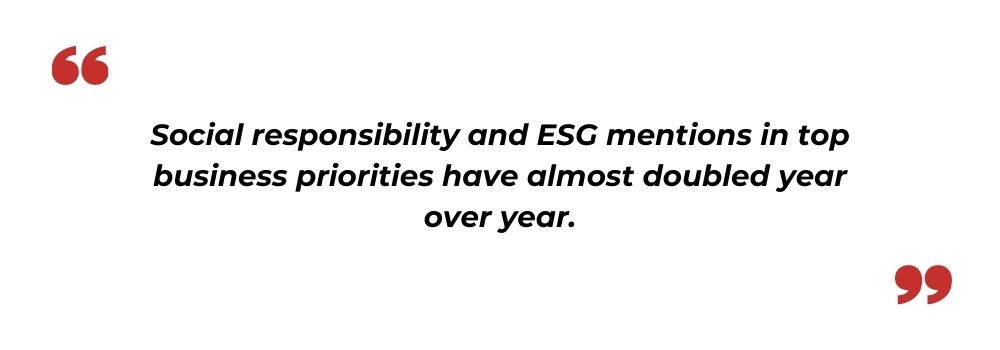ESG has been the talk of the town for quite some time now. The discussion around ways to integrate ESG in organizational frameworks and systems has been gaining momentum.
But why is ESG a topic of discussion and a critical aspect for organizations to get it right?
Companies that do not prioritize ESG are likely to lose the trust of their investors, employees, customers, and the public. It has become as straightforward as that. 83% of customers think the organization should be actively shaping ESG best practices, according to findings from PwC. Not only this but 86% of workers wish to work with organizations that have the same values as them.

Moreover, the overwhelming evidence suggests that in today's market, the success of an organization integrated with ESG initiatives and values is linked directly to its positive financial performance. ESG maturity is crucial for the people as well as the culture of an organization. It helps in engaging with the employees, attracting new talent along with improving efficiency and compliance.
The integration of ESG into everyday operations, systems, processes, and overall strategy implies that it is a crucial element comprehended by all stakeholders. Leaders are championing ESG as an integral aspect of their company’s culture.
ESG is now gaining a real presence within the organization’s structure, strategy, and systems, in a collaborative and integrated manner. But what are the fundamental ways to make this happen?
Read more: Less Is More: Embracing the New Trends in Affordability and Sustainability
Integrating ESG in Business Operations
Integrating ESG or environmental, social, and governance aspects in business operations assist in long-term value creation, thus decreasing risk factors ascending from national and global factors.

But can ESG help future-proof businesses?
With the global economy going through a phase of uncertainty along with the amplification of several natural and social disruptions, organizations are rethinking their business strategies. The COVID-19 pandemic has also been instrumental in strengthening the importance of the ESG framework in organizational operations as a key process for long-term business resilience.
In this increasingly uncertain and volatile world, businesses are facing new challenges. However, ESG offers a structured framework for businesses to stay resilient along with holistically protecting the people, the planet, and profits. ESG is the new tool that categorizes aspects conventionally associated with sustainability and corporate responsibility. It also has a material financial impact on the organization’s short-term and long-term value creation.
Businesses are going beyond non-financial reporting and employing ESG data reporting measures in their integrated profit and loss approach. This enables them to correlate or monetize the positive and negative impact of business operations through a range of capitals, thereby strengthening their long-term value creation. This growing significance of ESG as a framework is assisting businesses to holistically safeguard their operations as well as develop an ESG governance to gauge the risks and issues that are not possible through conventional mechanisms.

-
Integrating ESG With Organization's Strategy and Purpose
Industry leaders need to communicate a clear vision that helps establish the significance of ESG. Today, incorporating ESG in operations is much more than just ticking a box activity. It should be integrated with plans and actions. Boards should guide the way by listening and listing the concerns and insights from all quarters, as well as offering diverse perspectives on what ESG is all about.
Although it is great to have ESG goals, businesses should not only employ measures but also achieve them by making ESG functionalities a part of measurable progress. ESG should be incorporated as an integral element of planning, people, culture, and purpose to hit set goals.
Prioritizing ESG will empower organizational leaders to demonstrate their commitment to pursuing its purpose. By integrating ESG at the strategic level, businesses can affirm that ESG is a critical aspect of their operational framework.
Read more: Driving Sustainable Innovations: AI for ESG Data Challenges

-
Integrating ESG to Connect People and Build Collaboration
ESG reporting requires more than just compliance checkers. The ESG reporting team should also include collaborators who are able to connect with all the individuals at your organization, thus creating a hub. Their roles should not be concerned with collating and applying data but with staying connected with global developments and presenting new methods for ESG maturity. An ESG team in an organization is with allocating a central office; that's how important they are in the value chain. The ESG team should work towards building relationships with external stakeholders and advisors, the consumer community, and the government. By establishing a strong system in place within the organization, the ESG team can collaborate with other departments and make valuable and respected contributions at meetings.
-
Integrating ESG With Operational Process at All Levels
ESG framework extends at all levels in an organization. It involves people and data from every department. However, the only problem is the way with which ESG has been traditionally managed. It ends up taking a lot of time when dealing with data gathering and preparing reports. With changes in regulations and staff, businesses can employ their resources in meaningful operations that will lead to progress.
Organizations can connect and automate their ESG processes to maximize efficiency. This will ensure consistency across all levels, including processes, systems, and people. Integrated ESG offers flexibility, better capability along with benchmarking performance. It also helps convert insight into action.
Read more: ESG & Sustainability: Top ESG Challenges for Companies to Tackle in 2022

Building Transparency and Trust
For effective ESG reporting, organizations need to steer their operations with support from investor engagement. With corporate reporting becoming increasingly integral to business strategy. It offers enhanced and structured ESG disclosures alongside other data to demonstrate how a business is driving value for its stakeholders. However, there has been an increase in pressure on corporate leaders, investors, stakeholders, asset managers as well as customers to enhance their ESG reporting. Today, all the stakeholders demand a full assessment to detail the organization's ESG factors to understand the impact of their decisions.
ESG integration in the strategy framework can help improve performance as well as enhance the competitiveness of an organization. It incorporates redefining operational processes to enhance and sustain profitability. The potential value of ESG integration includes the following:
-
Long-term value creation by identifying ESG opportunities and risks
-
Enhanced brand reputation among investors, employees as well as consumers
-
Improved market differentiation through sustainable strategic positioning
-
Transparent relationships with stakeholders

Key Highlights
-
Organizations and boards are positioning ESG at the heart of their operational strategy to build risk resilience as well as to drive new opportunities for growth.
-
The COVID-19 pandemic reinforced the significance of the ESG framework as a key strategy for building long-term business resilience as well as accelerating the transition to a multi-stakeholder approach.
-
Employing a structured ESG reporting framework enables businesses to address major external and internal challenges, including economic uncertainty, along with the need to build a clear ESG mandate for the investors and stakeholders.
-
Employing Critically, long-term resilience advocates for businesses that meet stakeholder expectations and have sustainable business models in addition to profitability.
-
Three priorities that are supporting organizations with strategic ESG decision-making include-
-
the right board operating model,
-
innovative approaches to reward
-
effective and structured ESG reporting
Read more: Reenergizing the Workplace: Ways to Manage and Overcome COVID fatigue
.jpg)
In Conclusion
Today, ESG no longer requires an introduction as well as an explanation. ESG is being firmly incorporated into the mainstream operations of corporate boardrooms, investor meetings, and regulators’ remarks. However, ESG is yet to be mainstreamed in internal corporate governance and operations at the individual level. For organizations to meaningfully factor in ESG reporting in their corporate purpose, they need to accurately integrate ESG across corporate culture and not keep it restricted to the boardroom.
More than acknowledgment, ESG demands gravitas. By harnessing the connection between culture, governance, and the ESG framework, businesses are incorporating a paradigm shift in their entire value culture. The ESG agenda can unlock long-term value for businesses. However, it needs to be tied well with the business strategy for effective governance.
A consistent and companywide sustainable approach will ensure that ESG reporting gets incorporated into an organization’s culture at each level. Integrating ESG and corresponding risks with the stakeholder will enable businesses to build a culture that can tackle crises with proper governance.
With a presence in New York, San Francisco, Austin, Seattle, Toronto, London, Zurich, Pune, Bengaluru, and Hyderabad, SG Analytics, a pioneer in Research and Analytics, offers tailor-made services to enterprises worldwide.
A leader in ESG Consulting services, SG Analytics offers bespoke sustainability consulting services and research support for informed decision-making. Contact us today if you are in search of an efficient ESG integration and management solution provider to boost your sustainable performance.









